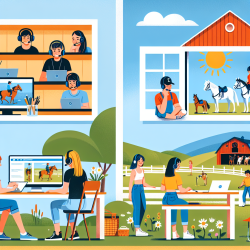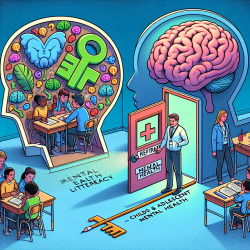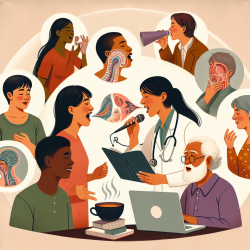Introduction
The COVID-19 pandemic has brought unprecedented challenges to various sectors, including riding lesson barns and summer camps in Ontario. As a Special Education Director, understanding the adaptive strategies these facilities employed can offer valuable insights into improving practices in educational and therapeutic settings. This blog explores key findings from the research article, "The Effect of the COVID-19 Pandemic on Riding Lesson Barns and Summer Camps in Ontario," and how practitioners can leverage these insights for skill enhancement and further research.
Key Findings and Practical Applications
The research highlighted several adaptive strategies that riding facilities implemented during the pandemic:
- Reduced Group Sizes: By limiting the number of students per lesson, barns ensured safer environments. This approach can be mirrored in educational settings to maintain social distancing while providing personalized attention.
- Strict Hygiene Protocols: Regular disinfection of high-contact areas and equipment was a common practice. Implementing similar hygiene measures in schools can help prevent the spread of infections.
- Limited Access: Controlling access to certain areas helped manage crowding. Schools can adopt this by staggering class schedules or limiting access to common areas.
- Facemask Usage: Although initially limited, the importance of facemasks was later emphasized. Encouraging mask-wearing in educational environments can significantly reduce transmission risks.
Positive Outcomes and Skill Enhancement
Despite the challenges, the pandemic also led to positive outcomes:
- Time for Reflection: The downtime allowed for reflection on business practices, which can be applied to educational settings for curriculum evaluation and improvement.
- Increased Respect for Rules: The pandemic fostered a greater respect for barn rules, highlighting the importance of clear communication and enforcement of guidelines in schools.
- Focus on Relationships: Assigning specific students to specific horses enhanced bonds. Similarly, fostering strong relationships between students and educators can improve learning outcomes.
Encouraging Further Research
The study encourages further research into adaptive strategies across various sectors. Practitioners are urged to explore how these strategies can be tailored to educational and therapeutic settings to enhance resilience and adaptability in the face of future challenges.
Conclusion
The insights from Ontario's riding lesson barns and summer camps offer valuable lessons for improving practices in educational and therapeutic settings. By implementing adaptive strategies and fostering positive outcomes, practitioners can enhance their skills and prepare for future challenges.
To read the original research paper, please follow this link: The Effect of the COVID-19 Pandemic on Riding Lesson Barns and Summer Camps in Ontario.










